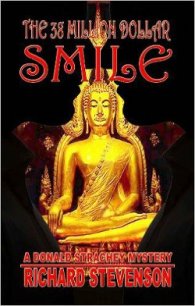Congo - Crichton Michael (книги регистрация онлайн бесплатно .TXT) 📗
“These gray gorillas possess that same intelligence, yet they have been single-mindedly bred to be the primate equivalent of Doberman pinschers-guard animals, attack animals, trained for cunning and viciousness. But they are much brighter and more resourceful than dogs. And they will continue their attacks until they succeed in killing us all, as they have killed everyone who has come here before.”
3. Looking Through the Bars
IN 1975, THE MATHEMATICIAN S. L. BERENSKY reviewed the literature on primate language and reached a startling conclusion. “There is no doubt,” he announced, “that primates are far superior in intelligence to man.”
In Berensky’s mind, “The salient question-which every human visitor to the zoo intuitively asks-is, who is behind the bars? Who is caged, and who is free?… On both sides of the bars primates can be observed making faces at each other. It is too facile to say that man is superior because he has made the zoo. We impose our special horror of barred captivity-a form of punishment among our species-and assume that other primates feel as we do.”
Berensky likened primates to foreign ambassadors. “Apes have for centuries managed to get along with human beings, as ambassadors from their species. In recent years, they have even learned to communicate with human beings using sign language. But it is a one-sided diplomatic exchange; no human being has attempted to live in ape society, to master their language and customs, to eat their food, to live as they do. The apes have learned to talk to us, but we have never learned to talk to them. Who, then, should be judged the greater intellect?”
Berensky added a prediction. “The time will come,” he
said, “when circumstances may force some human beings to communicate with a primate society on its own terms. Only then human beings will become aware of their complacent egotism with regard to other animals.”
The ERTS expedition, isolated deep in the Congo rain forest, now faced just such a problem. Confronted by a new species of gorilla-like animal, they somehow had to deal with it on its own terms.
During the evening, Elliot transmitted the taped breath sounds to Houston, and from there they were relayed to San Francisco. The transcript which followed the transmission was brief:
Seamans Wrote: RECVD TRNSMISN. SHLD HELP.
IMPORTNT-NEED TRNSLATION SOON, Elliot typed back. WHN HAVE?
COMPUTR ANALYSS DIFICLT-PROBLMS XCEED MGNITUDE CSL / JSL TRNSLATN.
“What does that mean?” Ross said.
“He’s saying that the translation problems exceed the problem of translating Chinese or Japanese sign language.”
She hadn’t known there was a Chinese or Japanese sign language, but Elliot explained that there were sign languages for all major languages, and each followed its own rules. For instance, BSL, British sign language, was totally different from ASL, American sign language, even though spoken and written English language was virtually identical in the two countries.
Different sign languages had different grammar and syntax, and even obeyed different sign traditions. Chinese sign language used the middle finger pointing outward for several signs, such as TWO WEEKS FROM NOW and BROTHER, although this configuration was insulting and unacceptable in American sign language.
“But this is a spoken language,” Ross said.
“Yes,” Elliot said, “but it’s a complicated problem. We aren’t likely to get it translated soon.”
By nightfall, they had two additional pieces of information. Ross ran a computer simulation through Houston which came back with a probability course of three days and a standard deviation of two days to find the diamond mines. That meant they should be prepared for five more days at the site. Food was not a problem, but ammunition was: Munro proposed to use tear gas.
They expected the gray gorillas to try a different approach, and they did, attacking immediately after dark. The battle on the night of June 23 was punctuated by the coughing explosions of canisters and the sizzling hiss of the gas. The strategy was effective; the gorillas were driven away, and did not return again that night.
Munro was pleased. He announced that they had enough tear gas to hold off the gorillas for a week, perhaps more. For the moment, their problems appeared to be solved.
DAY 12: ZINJ
1. The Offensive
SHORTLY AFTER DAWN, THEY DISCOVERED THE bodies of Mulewe and Akari near their tent. Apparently the attack the night before had been a diversion, allowing one gorilla to enter the compound, kill the porters, and slip out again. Even more disturbing, they could find no clue to how the gorilla had got through the electrified fence and back out again.
A careful search revealed a section of fence torn near the bottom. A long stick lay on the ground nearby. The gorillas had used the stick to lift the bottom of the fence, enabling one to crawl through. And before leaving, the gorillas had carefully restored the fence to its original condition.
The intelligence implied by such behavior was hard to accept. “Time and again,” Elliot said later, “we came up against our prejudices about animals. We kept expecting the gorillas to behave in stupid, stereotyped ways but they never did. We never treated them as flexible and responsive adversaries, though they had already reduced our numbers by one fourth.”
Munro had difficulty accepting the calculated hostility of the gorillas. His experience had taught him that animals in nature were indifferent to man. Finally he concluded that “these animals had been trained by men, and I had to think of them as men. The question became what would I do if they were men?”
For Munro the answer was clear: take the offensive.
Amy agreed to lead them into the jungle where she said the gorillas lived. By ten o’clock that morning, they were moving up the hillsides north of the city armed with machine guns. It was not long before they found gorilla spoor- quantities of dung, and nests on the ground and in the trees. Munro was disturbed by what he saw; some trees held twenty or thirty nests, suggesting a large population of animals.
Ten minutes later, they came upon a group of ten gray gorillas feeding on succulent vines: four males and three females, a juvenile, and two scampering infants. The adults were lazy, basking in the sun, eating in desultory fashion. Several other animals slept on their backs, snoring loudly. They all seemed remarkably unguarded.
Munro gave a hand signal; the safeties clicked off the guns. He prepared to fire into the group when Amy tugged at his trouser leg. He looked off and “had the shock of my bloody life. Up the slope was another group, perhaps ten or twelve animals-and then I saw another group-and another-and another still. There must have been three hundred or more. The hillside was crawling with gray gorillas.”
The largest gorilla group ever sighted in the wild had been thirty-one individuals, in Kabara in 1971, and even that sighting was disputed. Most researchers thought it was actually two groups seen briefly together, since the usual group size was ten to fifteen individuals. Elliot found three hundred animals “an awesome sight.” But he was even more impressed by the behavior of the animals. As they browsed and fed in the sunlight, they behaved very much like ordinary gorillas in the wild, but there were important differences.
“From the first sighting, I never had any doubt that they had language. Their wheezing vocalizations were striking and clearly constituted a form of language. In addition they used sign language, although nothing like what we knew. Their hand gestures were delivered with outstretched arms in a graceful way, rather like Thai dancers. These hand movements seemed to complement or add to the sighing vocalizations. Obviously the gorillas had been taught, or had elaborated on their own, a language system far more sophisticated than the pure sign language of laboratory apes in the twentieth century.”


![[Magazine 1968-012] - The Million Monsters Affair - Davis Robert Hart (серия книг .txt) 📗](/uploads/posts/books/56864/56864.jpg)

